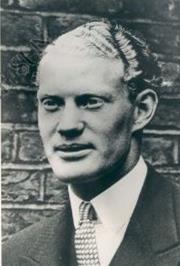

Queer Places:
Eton College, Windsor SL4 6DW, UK
University of Oxford, Oxford, Oxfordshire OX1 3PA
Herstmonceux Castle, Airy Road, Herstmonceux, East Sussex BN27 1RN, UK
 Major Sir Herbert Paul Latham, 2nd Baronet (22 April 1905 – 24 July 1955)[1]
was a British Conservative Party politician who served as Member of Parliament
(MP) for Scarborough and Whitby constituency from 1931 to 1941. Michael Bloch
describes him in Closet Queens (2015) as someone who: delighted in causing
pain and discomfiture to others; he was also a promiscuous and predatory
homosexual. For more than a decade he conducted a sado-masochistic affair with
Eddy Sackville-West (later 5th Baron Sackville) […] a talented writer and
musician, who was finally driven (in 1937) to a nervous breakdown by the
relationship.
Major Sir Herbert Paul Latham, 2nd Baronet (22 April 1905 – 24 July 1955)[1]
was a British Conservative Party politician who served as Member of Parliament
(MP) for Scarborough and Whitby constituency from 1931 to 1941. Michael Bloch
describes him in Closet Queens (2015) as someone who: delighted in causing
pain and discomfiture to others; he was also a promiscuous and predatory
homosexual. For more than a decade he conducted a sado-masochistic affair with
Eddy Sackville-West (later 5th Baron Sackville) […] a talented writer and
musician, who was finally driven (in 1937) to a nervous breakdown by the
relationship.
The son of Sir Thomas Paul Latham and his wife Florence Clara née Walley, he was educated at Eton College and Magdalen College, Oxford.[2]
Between 1928 and 1934 Latham was a member of the London County Council, representing Lewisham East as a member of the Conservative-backed Municipal Reform Party.[2][3]
At the 1929 general election, he stood as the Conservative candidate in Rotherham,[2] a safe seat for the Labour Party where he was runner-up with 23% of the votes.[4]
In April 1931 the standing MP for Scarborough and Whitby, Sidney Herbert, resigned from the House of Commons. Latham was selected as the Conservative candidate for the resulting by-election on 6 May, which he won a majority of 5% of the votes over his Liberal Party opponent.[4]
In 1933 Latham married Lady Patricia Doreen Moore, the daughter of Henry Moore, 10th Earl of Drogheda and Kathleen Pelham Burn.[2] She divorced him in 1943 and died in 1947. He was succeeded in the baronetcy by their only son, Richard Thomas Paul Latham, born in April 1934.[2]
In 1932 Latham purchased Herstmonceux Castle in Sussex and carried on its restoration.[2]
During World War II, despite being exempt from military service, Latham volunteered to join the army. In 1941, however, he was arrested [5] for "improper behaviour", a homosexual act, with three gunners and a civilian[6] (letters he had written to those involved had been discovered) while serving as an officer in the Royal Artillery.[2] Latham then tried to kill himself by riding a motorcycle into a tree.[7][8]
He was court-martialled and found guilty of ten charges of indecent conduct and of attempted suicide and was discharged dishonourably and imprisoned for two years without hard labour. Latham's court-martial was the first time a sitting MP who was also in the army had been court-martialled since 1815. He resigned his seat in Parliament.[9]
After Latham was released from prison, his friend James Lees-Milne visited him in May 1943 and observed: He talked incessantly of himself […] his conversation is more depraved than anyone’s I have ever heard. He is obsessed by sex and already haunts the most dangerous places, as he told me […] He is a sadistic man. He had the grace to acknowledge Eddy [Sackville-West]’s great kindness in helping him, yet he is irritated by Eddy’s devotion. I am terribly sorry for him but would pity him more if he were less wayward and less egocentric.12 Three years later Lees-Milne discovered a different Latham: ‘He was giggly and rather endearing […] He is greatly improved. Far less hysterical and more reconciled. Less sex mad. Seems to take a saner view of life.’13 Latham died in 1955 at the age of 50.
In 1967 Godfrey Winn reflected on his former Eton schoolboy friend: he had been born with the seeds of arrogance in his make-up, for which the Greeks had a word which cannot be bettered. Hubris. To imagine yourself above the power of the wrath of the gods. No one is. Unfortunately, Paul Latham was to grow up believing that there was one law for him and another for his fellows. There isn’t.
My published books: